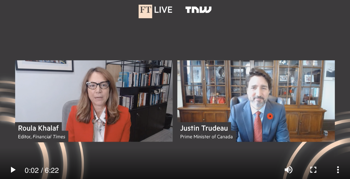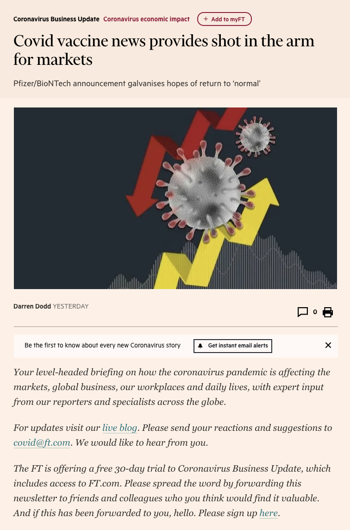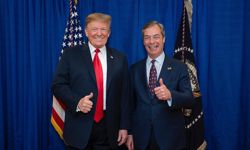
You can state with absolute certainty that Roula Khalaf is the first editor of the Financial Times to be portrayed in a top Hollywood movie – Martin Scorsese’s The Wolf of Wall Street.
Jordan Belfort, broker, convicted felon and Wolf says this of her in his book on which the film is based: “The press onslaught had started in 1991, when an insolent reporter from Forbes magazine, coined me as a twisted version of Robin Hood who robs from the rich and gives to himself and his merry band of brokers. She deserves an A for cleverness, of course.”
She is also the first FT editor who does not fit the usual mould of Oxbridge-educated Brits usually rooted in the City of London, and certainly the first Arabic speaking FT editor brought up in Beirut when the Lebanon was tearing itself apart.
She is also the first woman editor of the paper but does that matter anymore, or is it even worthy of note when there are female editors of The Guardian and the Sunday Times and others too in what used to be called Fleet Street?
“Of course it’s a relevant issue to be the first woman editor in 130 years. I am very happy to see that there are several woman editors now in the UK and that certainly wasn’t the case a few years back,” Khalaf replies.
After university education in the US, and Forbes, she progressed through the FT roles of North Africa editor, Middle East editor, assistant editor and foreign editor and then deputy editor, traditionally a career graveyard slot for those who aspired, unsuccessfully, to take the editorial chair.
Khalaf believes that her appointment was “a signal about the evolution of the FT” into a truly international publication under the ownership of Nikkei of Japan, although her predecessor as editor, the Oxford-educated Lionel Barber was also very international in his approach.
“I definitely have a different style. I am very much a reporter at heart,” says Khalaf who found herself in many of the world’s hotspots such as Baghdad, although traditionally the FT concentrates more on the political and economic implications of unrest rather than the actual warfare itself.
This is the story of the media during the pandemic. If you have a subscriptions business, then your subscriptions business has done well.
Impact of Covid
It was always going to be an exciting news year when Khalaf took over in January – there was the impact of the Boris Johnson general election, the tortuous Brexit transition period and the US presidential election to look forward to.
“In the first few weeks, I had all the plans laid out for what I was going to do this year and people talk about your first 100 days,” she notes.
And then along came Covid-19.
“I am on the biggest story ever really,” says Khalaf and, if you can say such a thing, then the FT and its editor and journalists have had a very good Covid crisis.

Khalaf says the FT took measures early and it paid off. On the business side, there was FT Live which created the three-day online Global Boardroom which attracted no less than 50,000 registrations, with another event planned.
Advertising has indeed been down but by considerably less than the worst case scenario and an early recovery in Asia and in luxury products helped, as will the Biden victory and the increasing optimism over an effective Covid vaccine.
Usually when markets are doing well, so does the FT.
“At the beginning, the shock to advertising was so big that for the first time in my life, I was contemplating not having Monday to Friday (print editions) in ten years but I have greater confidence now and of course the weekend sales are doing terrifically well,” she says.
As with Brexit, Khalaf likes creating hubs with dedicated editors to cope with important stories.
All about subs
But for the FT editor, the big story of the paper’s evolution as a business has been the confirmation of the importance of subscriptions.
“This is the story of the media during the pandemic. If you have a subscriptions business, then your subscriptions business has done well. People want to read more so there is a real vote of confidence in the news business during the pandemic,” Khalaf argues.
FT subscriptions are up 7 per cent year-on year to 1.1 million – 950,000 of them digital, and levels of engagement have grown enormously.
On the journalistic front, Khalaf believes the FT has been “nimble and on the story from the start”.
The paper had someone in Wuhan at an early stage and then followed the pandemic from country to country and produced new products to drive engagement. They have included live blogs which follow the Covid story, effectively, 24 hours a day starting in London, then moving to New York time and on to Asia.
Khalaf adds that the data team has excelled during the crisis and the FT Covid trackers have been quoted all over the world.

A newsletter, Covid Business Update has helped to drive subscriptions to the FT.
The FT did not think it would do well on health issues, not its mainstream environment, but built a health and science team under a dedicated editor and the business and economic side of the pandemic “has been our story”.
There was much longer term planning on a global series that sought to explore whether the pandemic could have been avoided. It came out of regular meetings that took a step back to look at how to cover the longer-term implications.
It culminated in a look at how Africa, usually lacking the most modern medical equipment, had done relatively well by taking early action against a disease largely imported from Europe. The continent was helped by knowledge of how to deal with infectious diseases and a young population where obesity is rare.
In an interview with Vogue written before Khalaf took over as editor, the magazine concluded that she was “a level-headed radical”.
She observes: “Nobody ever called me that before but I was interested not shocked.”
Training of young journalists is difficult remotely, as is developing, or keeping up with sources.
Structural changes
Apart from the person she is, and the background she has come from, one of the ways Khalaf is radical is the emphasis on changing structures within the paper.
“Structure is really, really important and we learned that with Brexit right after the referendum by appointing a Brexit editor and it’s transformed our coverage,” she argues.
Some of the changes are gentle but still telling, such as modernising the nature of the daily news conferences.
Rather than reading out the lists of all the stories from the various desks, something that has happened from time immemorial, the news editor chats with the various departments and then conference devotes most of its time to the really big stories of the day.
As with Brexit, she likes creating hubs with dedicated editors to cope with important stories.
The latest is the climate change hub called Climate Capital after FT reader surveys showed that interest in the business implications of climate change was “off the chart”.
For Khalaf, climate change is a business issue but the aim is to make the FT an authority on the subject rather than pumping out lots of little stories, many PR driven.
Remote working has gone more smoothly than she expected but Khalaf, who comes to the office two or three times a week, believes a flexible approach is likely to develop.
Training of young journalists is difficult remotely, as is developing, or keeping up with sources.
“I think in future, we are going to have some sort of hybrid system. The pandemic has shown up the fact that you don’t have to be in the office every day, but it has not shown that you don’t need the office at all,” the FT editor concludes.
The world has changed and the consensus has shifted, and you can also see it in the emphasis on executive pay, on dividends and bonuses.
Changing consensus
Her radicalism is also seen in her belief that capitalism “needs a reset”.
The FT will always believe in free markets and capitalism “but not in excess,” she explains.
The centre of economic consensus is moving and chief executives are already spending much more time thinking about issues such as climate change and diversity than they ever did before.
“The world has changed and the consensus has shifted, and you can also see it in the emphasis on executive pay, on dividends and bonuses,” says Khalaf who believes the FT’s natural role is to influence and deepen such trends.
On gender, the FT has taken steps to encourage more women readers by monitoring everything from use of pictures to people quoted in stories and by making the paper less overtly male, and the number of female readers has risen two or three percentage points as a result.
As part of the battle to attract younger readers – they particularly like stories about work and career progression – the FT is working hard on ethnic and racial diversity.
“The more diverse our own staff is, the more we will get a diversity of readers. I do think the two are connected,” Khalaf believes.
Traditionally, with very few exceptions, Financial Times editors usually serve for around ten years or so, which in Khalaf’s case would take her into her mid-50s.
If the pattern runs true, what does she hope to achieve in the next decade?
“I don’t know how long I will be editor. I really don’t, but I would like to leave the FT as a must read that you cannot do without, that you have to subscribe for, and for it to be a fully digital organisation from which the print product derives,” she replies.
“I would also hope we would have a more diverse staff that reflects the countries and the cities we cover,” says the editor brought up in Lebanon.
Finally, have the Japanese owners observed in every respect their commitment to honour the editorial independence of the FT?
“Absolutely. Our Japanese owners care a lot about our global media alliance. And they have the utmost respect for the FT, for the editorial and for the editorial independence of the FT,” says Roula Khalaf.
The more diverse our own staff is, the more we will get a diversity of readers. I do think the two are connected.
This article was first published in InPublishing magazine. If you would like to be added to the free mailing list, please register here.












